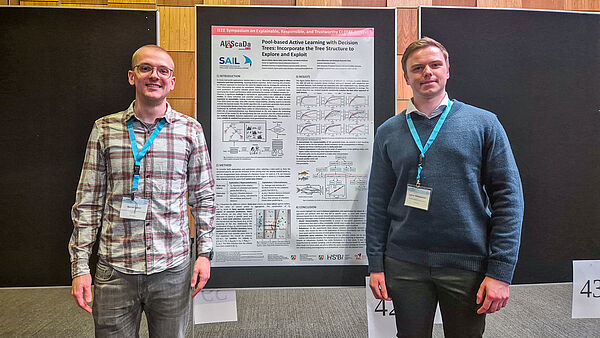Julian Bültemeier, research associate at the Institute Industrial IT (inIT) at Technische Hochschule Ostwestfalen-Lippe (TH OWL), presented the AI4ScaDa research project at this year's "IEEE Symposium Series on Computational Intelligence" (SSCI) 2025 in Trondheim, Norway. The renowned conference offered an ideal platform to present current developments in the field of computational intelligence and to exchange ideas with international colleagues. The newly structured, biennial symposium series, which comprised ten specialist symposia and impressively illustrated the diversity and depth of current research, deserves special mention.
Innovative active learning approach: Presentation of AI4ScaDa
As part of the AI4ScaDa project, Bjarne Jaster (Bielefeld University of Applied Sciences) and Julian Bültemeier presented an innovative active learning approach based on a GUIDE decision tree. The aim of this approach is to generate a maximum of knowledge with a minimum of data. Decision trees offer a high level of interpretability as they do not require additional validation data. This is particularly important for applications where data is only available to a limited extent or only at great expense. Experts from companies may use the decision trees to check the causality of the decisions made, which makes model validation more efficient. This has already been impressively validated in the use cases of the AI4ScaDa project.
The active learning approach applies the decision boundaries of the model to select new data points from a pool of unlabelled data. Two strategies are realised: Exploitation identifies data points close to the decision boundaries in order to improve accuracy, while exploration adds previously underrepresented data points to the labelled data set in order to further optimise model accuracy. At inIT, AI4ScaDa is part of the "Image Processing and Pattern Recognition, Sensor and Information Fusion" research group headed by Prof. Dr. Volker Lohweg.
AI4ScaDa presentation encourages dialogue
The presentation of AI4ScaDa in a short talk and a poster session facilitated in-depth discussions and encouraged dialogue on the use of AI with scarce data. Julian Bültemeier emphasised: “The discussions and suggestions from the international experts gave us a lot of input.”
Further information on AI4ScaDa can be found in the project publications: https://plattform.its-owl.de/projects/ai-for-scarce-data-maschinelles-lernen-und-informationsfusion-zur-nachhaltigen-nutzung-von-labor-und-kundendaten/AXYP8egrEQ


